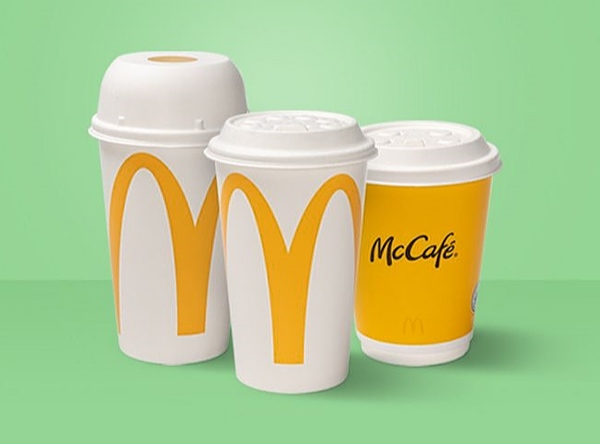MCDONALD'S
German franchises jettison plastic lids, straws / Paper to cover takeaway drinks
McDonald’s Germany (Munich; www.mcdonalds.com) plans to do away with plastic lids for beverage cups in favour of a paper lid with an integrated drink opening for takeout orders, the company said.
In addition, soft drinks are to be sold without the paper drinking straw introduced four years ago, and the fast-food giant also wants to replace plastic cups for Iced Coffee Shakes with paper. The obligatory cream mountain atop the drink will be covered by a dome lid made of paper fibres, the company announced.
In addition, soft drinks are to be sold without the paper drinking straw introduced four years ago, and the fast-food giant also wants to replace plastic cups for Iced Coffee Shakes with paper. The obligatory cream mountain atop the drink will be covered by a dome lid made of paper fibres, the company announced.
 Cardboard instead of plastic, now also for the lids in the more than 1,450 fast-food restaurants in Germany (Photo: McDonald's) |
The gastronomic goliath said it wants to save around 560 t/y of plastic and 430 t/y of paper/cardboard through these conversions in Germany. Since 2019, McDonald’s has increasingly been switching packaging to plastic-free or lower plastic alternatives, with reusable packaging available since the end of 2022.
Although reusables have been obligatory for the entire takeaway range in Germany since the beginning of 2023, it has been only sluggishly accepted by customers, according to reports. Additionally, the country’s Packaging Act (VerpackG) says catering businesses only have to offer a reusable alternative if the disposable packaging contains plastic. So, the small boxes and wrappers for burgers, fries, and the like require no reusable counterpart as they are made of cardboard or paper without a plastic coating. McDonald’s thus so far only offers reusable alternatives for drinks and ice cream containers.
However, the amount of packaging accumulating at the more than 1,450 McDonald’s restaurants in Germany remains a source of criticism. The new EU Packaging and Packaging Waste Regulation (PPWR), which stipulates mandatory reusability of all food packaging from 2040 onwards, is supposed to provide a remedy.
The fact that such an obligation for reuse could in turn lead to an increase in plastic packaging was recently pointed out in a study by US consulting firm A.T. Kearney (Chicago, Illinois; www.atkearney.com).
22.05.2023 Plasteurope.com [252770-0]
Published on 22.05.2023

 German version of this article...
German version of this article...